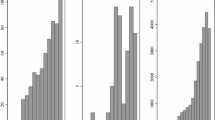Abstract
In this brief squib, I take up the first of the provocations put forward by Wise and Schwarz in their recent article and make an attempt to spark further discussion. Specifically, I argue that instead of attempting to agree on an overarching, unified conceptual framework for CSCL from the top down, and rather than synthesizing findings from CSCL research from the bottom up, we could take a taxonomy of CSCL support dimensions as a starting point and engage in a concerted research effort with the aim of working towards a comprehensive framework of CSCL support. I therefore propose such a taxonomy, which currently comprises 12 dimensions. By referring to some of my own research, I demonstrate how the proposed process of providing evidence-based design principles for CSCL support that cut across and interleave the dimensions of the taxonomy could work.
Similar content being viewed by others
References
Diziol, D., & Rummel, N. (2010). How to design support for collaborative e-learning: A framework of relevant dimensions. In B. Ertl (Ed.), E-collaborative knowledge construction: Learning from computer-supported and virtual environments (pp. 162–179). Hershey: IGI Global.
Fischer, F., Kollar, I., Stegmann, K., & Wecker, C. (2013). Toward a script theory of guidance in computer-supported collaborative learning. Educational Psychologist, 48(1), 56–66.
Kapur, M. (2010). Productive failure in mathematical problem solving. Instructional Science, 38(6), 523–550.
Kapur, M. (2012). Productive failure in learning the concept of variance. Instructional Science, 40(4), 651–672.
Kapur, M. (2014). Productive failure in learning math. Cognitive Science, 38(5), 1008–1022.
Kapur, & Rummel. (2012). Productive failure in learning from generation and invention activities. Instructional Science, 40(4), 645–650.
Loibl, K., Roll, I., & Rummel, N. (2017). Towards a theory of when and how problem solving followed by instruction supports learning. Educational Psychology Review, 29(4), 693–715.
Loibl, K., & Rummel, N. (2014a). Knowing what you don't know makes failure productive. Learning and Instruction, 34, 74–85.
Loibl, K., & Rummel, N. (2014b). The impact of guidance during problem-solving prior to instruction on students’ inventions and learning outcomes. Instructional Science, 42(3), 305–236.
Magnisalis, I., Demetriadis, S., & Karakostas, A. (2011). Adaptive and intelligent systems for collaborative learning support: A review of the field. IEEE Transactions on Learning Technologies, 4(1), 5–20.
Roll, I., Aleven, V., & Koedinger, K. R. (2009). Helping students know ‘further ’—Increasing the flexibility of students’ knowledge using symbolic invention tasks. In N. A. Taatgen & H. van Rijn (Eds.), Proceedings of the 31st Annual Conference of the Cognitive Science Society (pp. 1169–1174). Austin: Cognitive Science Society.
Roll, I., Aleven, V., & Koedinger, K. R. (2011). Outcomes and mechanisms of transfer. In L. Carlson, C. Hölscher, & T. Shipley (Eds.), Proceedings of the 33rd Annual Conference of the Cognitive Science Society (pp. 2824–2829). Austin: Cognitive Science Society.
Rummel, N. (2016). Computer-supported collaborative learning: Working towards a utopian future. Keynote Lecture given at the 24th International Conference on Computers in Education, IIT Bombay, India, Nov 28 - Dec 2.
Rummel, N. (2017). Working towards a comprehensive instructional framework for CSCL support. Keynote Lecture given at the 9th International Conference for Computers in Education. Porto, Portugal, April 21–23.
Rummel, N., & Spada, H. (2005). Learning to collaborate: An instructional approach to promoting collaborative problem-solving in computer-mediated settings. The Journal of the Learning Sciences, 14(2), 201–241.
Rummel, N., Walker, E., & Aleven, V. (2016). Different futures of adaptive collaborative learning support. Journal of Artificial Intelligence in Education, 26(2), 784–795.
Schwartz, D. L., & Martin, T. (2004). Inventing to prepare for future learning: The hidden efficiency of encouraging original student production in statistics instruction. Cognition and Instruction, 22(2), 129–184.
Soller, A., Martínez, A., Jermann, P., & Muehlenbrock, M. (2005). From mirroring to guiding: A review of state of the art technology for supporting collaborative learning. International Journal of Artificial Intelligence in Education, 15(4), 261–290.
Stahl, G. (2017). Group practices: A new way of viewing CSCL. International Journal of Computer-Supported Collaborative Learning, 12(1), 113–126.
Van Lehn, K., Siler, S., Murray, C., Yamauchi, T., & Baggett, W. B. (2003). Why do only some events cause learning during human tutoring? Cognition and Instruction, 21(3), 209–249.
Walker, E., Rummel, N., & Koedinger, K. (2009). Beyond explicit feedback: New directions in adaptive collaborative learning support. In C. O’Malley, D. Suthers, P. Reimann, & A. Dimitracopoulou (Eds.), Computer Supported Collaborative Learning Practices- CSCL 2009 Conference Proceedings, Vol 1 (pp. 552–556). International Society of the Learning Sciences, Inc.
Westermann, K., & Rummel, N. (2012). Delaying instruction – Evidence from a study in a university relearning setting. Instructional Science, 40(4), 673–689.
Wise, A., & Schwarz, B. (2017). Visions of CSCL: Eight provocations for the future of the field. International Journal of Computer-Supported Collaborative Learning, 12, 423–467.
Acknowledgements
I would like to thank Erin Walker, Dejana Mullins, Vincent Aleven and Sebastian Strauß, who contributed to earlier versions of the taxonomy presented in this paper.
Author information
Authors and Affiliations
Corresponding author
Rights and permissions
About this article
Cite this article
Rummel, N. One framework to rule them all? Carrying forward the conversation started by Wise and Schwarz. Intern. J. Comput.-Support. Collab. Learn 13, 123–129 (2018). https://doi.org/10.1007/s11412-018-9273-2
Published:
Issue Date:
DOI: https://doi.org/10.1007/s11412-018-9273-2




